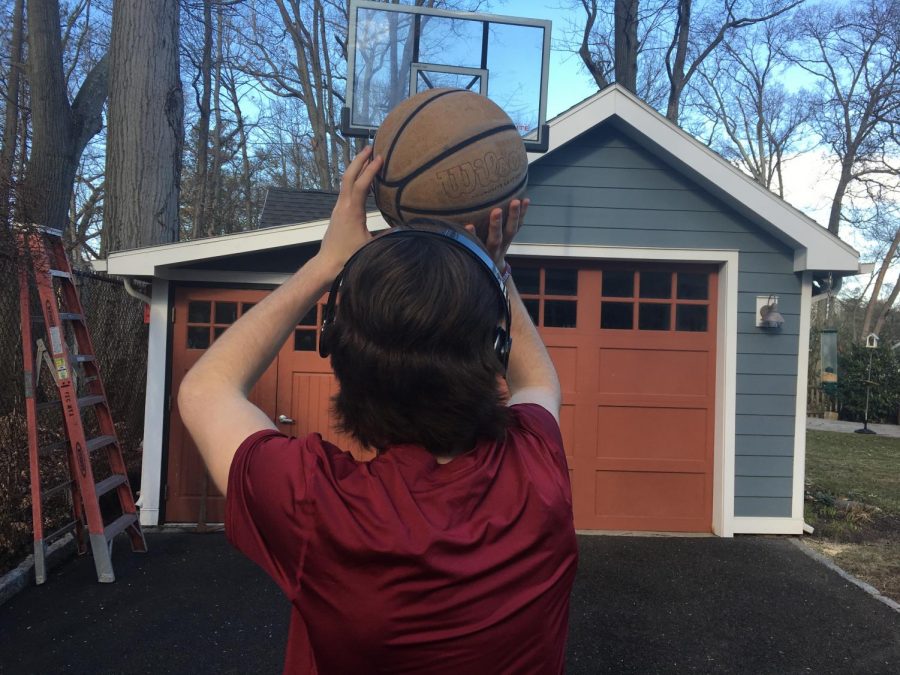Before the game, headphones go on
It’s two hours before the biggest game of the year. The rest of your teammates are already on the field warming up, but you stay behind to ease the stress. You throw on your headphones, turn up the volume and prepare yourself for the task at hand.
Music and sports: In our culture, the two words seem to naturally go together. But is there an aspect of music that actually benefits the brain during physical activity?
According to neuroscientist Daniel Levitin, a professor at McGill University, there is.
“[With] any athletic activity that involves some kind of timing, music—if it’s carefully chosen—can help you to perform better,” Levitin said in a lecture broadcast on YouTube.
Levitin studied the brain waves of humans while listening to music, and looked at the effect that it had on their performances.
“The neurons in your brain fire in synchrony to the tempo of the music that you’re listening to,” said Levitin. “So if you’re a runner and you can get music at a slightly faster pace than you would normally run, and then your neurons are firing at that pace, you can actually run faster.”
The same goes for lifting weights and other types of exercising, as the constant momentum of music helps athletes push forward and continue working hard, according to Levitin.
Senior lacrosse player Nicky Bond has noticed the effect music can have on the field and in the weight room.
“It gets you pumped up to compete,” said Bond. “It gets you in that killer mindset to keep going and not back down.”
Music has proven to have such a beneficial effect on performance that USA Track & Field, the national governing body for distance running, actually prohibits athletes from using headphones and other portable audio players on the track for championship races because they see this technology as giving runners a competitive edge.
And in addition to being beneficial during physical activity, music helps the brain mentally prepare for a big game by effectively relieving stress, bringing positive emotions into the mind of the athlete.
Dr. Costas Karageorghis, the world-leading researcher on music’s impact on performance, looked at the synchronization that Levitin focused on, but also found that music “may help in the attainment of flow, the zenith of intrinsic motivation,” according to a 2008 study that Karageorghis published.
His study focused on the relationship between pre-task music and netball shooting performance of three collegiate players. The players who chose their pre-task music showed significant improvement in their shooting performances compared to those who did not.
“Self-selected music and imagery could enhance athletic performance by triggering emotions and cognitions associated with flow,” stated Karageorghis in his study.
In other words, Karageorghis concluded that pre-task music helped the athletes achieve their peak states of motivation before their athletic trials, which in turn helped enhance their performances.
Senior football player Jacob Dayon uses music to bring positive emotions to mind, which help him prepare for the task at hand.
“Music before a big game motivates me, and helps me get all-around pumped up. It makes me energetic and passionate about what I’m about to do on the field,” said Dayon.
While music can help “pump up” players before a big game, Levitin also noted that music can help relieve stress before a performance.
“Listening to pleasurable music releases dopamine, and can thus function in that sense as an antidepressant,” said Levitin in his lecture.
By acting as an antidepressant, music can calm the body down, relieving any stress an athlete has prior to their performance, Levitin said.
“[Music] takes your mind off the pressure of the game and puts your attention on what’s important,” added Dayon. “It helps you block out the outside noise and adversity.”
Because music can help to both calm one down and pump one up before a game, there isn’t a “right” genre of music to listen to, making it totally depend on the athlete.
As Karageorghis noted, pre-task music that brings positive emotions to the mind of the athlete proves to be beneficial for performance.
This is why people listen to different types of music before a game. Senior lacrosse player Sydney Paoletti, for example, prefers hip-hop/rap music to pump her up before a game.
“I’m always listening to Meek Mill before my games,” said Paoletti. “It’s very intense and helps me get in the right mindset before my games.”
Yet Houston Texans defensive end JJ Watt has shown that listening to Zac Brown Band and other country music prepares him mentally before football games, as stated in his nationally televised Bose commercial.
There are many different genres that get athletes pumped-up before their games. Hard-hitting hip-hop may bring positive emotions to one person, yet something totally different, such as country music, may prepare another person. Overall, music proves to be beneficial no matter the genre, as long as what you’re listening to brings positive emotions and thoughts to your mind.
So whether you know it or not, music can enhance your sports performances. The types of music listened to may vary from person to person, yet there is one thing music helps all athletes achieve: focus.
“When you have your headphones in, people know not to talk to you,” Paoletti said. “You can focus on the game and leave all the adversity, all the criticism and all of your outside problems behind.”

